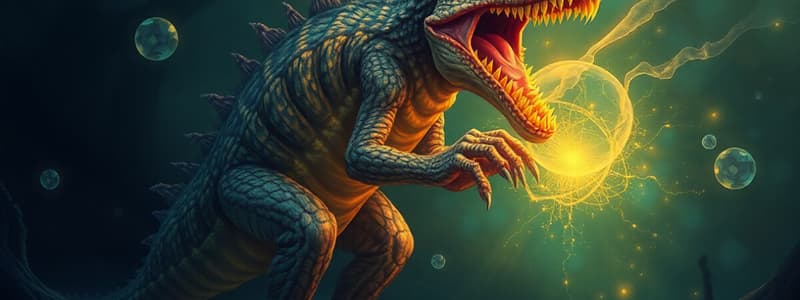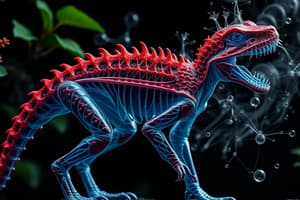Podcast
Questions and Answers
Which scientist is credited with the experiment that used a swan-necked flask to disprove the spontaneous generation of microorganisms?
Which scientist is credited with the experiment that used a swan-necked flask to disprove the spontaneous generation of microorganisms?
- Alexander Ivanovich Oparin
- Charles Robert Darwin
- Louis Pasteur (correct)
- Svante August Arrhenius
The Panspermia theory proposes that life on Earth originated from:
The Panspermia theory proposes that life on Earth originated from:
- Chemical reactions in hot water and vapor
- Spontaneous generation from the Earth's atmosphere
- The gradual accumulation of small changes over long periods of time.
- Spores or organic compounds arriving from outer space (correct)
The Oparin-Haldane theory, also known as the Chemical Evolution Theory, suggests that life arose from:
The Oparin-Haldane theory, also known as the Chemical Evolution Theory, suggests that life arose from:
- Spores coming from outer space
- A common ancestor through branching lineages.
- Organic compounds arriving via meteorites
- Inorganic matter under conditions present on primitive Earth (correct)
Which theory suggests that life has always existed and has no beginning or end?
Which theory suggests that life has always existed and has no beginning or end?
The experiment conducted by Miller and Urey, designed to test the Oparin-Haldane theory, involved:
The experiment conducted by Miller and Urey, designed to test the Oparin-Haldane theory, involved:
The concept of 'common descent' is best described as:
The concept of 'common descent' is best described as:
Which of the following concepts relates to the idea that large differences in organisms result from the accumulation of small changes over long periods of time?
Which of the following concepts relates to the idea that large differences in organisms result from the accumulation of small changes over long periods of time?
According to the theories provided, what serves as the basis for the taxonomic classification of animals?
According to the theories provided, what serves as the basis for the taxonomic classification of animals?
What is the primary characteristic that defines a hypothesis within the scientific method?
What is the primary characteristic that defines a hypothesis within the scientific method?
What characteristic is most important for an experiment to be considered a scientifically valid test of a hypothesis?
What characteristic is most important for an experiment to be considered a scientifically valid test of a hypothesis?
What does a control group help to determine in an experiment?
What does a control group help to determine in an experiment?
In the context of scientific inquiry, what distinguishes a theory from a hypothesis?
In the context of scientific inquiry, what distinguishes a theory from a hypothesis?
Which of the following accurately describes the core idea behind the Theory of Abiogenesis?
Which of the following accurately describes the core idea behind the Theory of Abiogenesis?
What was the main point of Francesco Redi's experiments with decaying meat?
What was the main point of Francesco Redi's experiments with decaying meat?
Both Lazzaro Spallanzani and Louis Pasteur performed experiments involving broth, what key idea did these experiments aim to prove, which is linked to the germ theory of disease?
Both Lazzaro Spallanzani and Louis Pasteur performed experiments involving broth, what key idea did these experiments aim to prove, which is linked to the germ theory of disease?
What was a key critique or objection raised against Lazzaro Spallanzani's experiment regarding boiling broth?
What was a key critique or objection raised against Lazzaro Spallanzani's experiment regarding boiling broth?
Flashcards
Scientific Method
Scientific Method
The systematic process of investigation involving observation, hypothesis, experimentation, and conclusion.
Hypothesis
Hypothesis
A testable explanation for observations, aiming to answer a specific question.
Control Group
Control Group
An experiment designed to test a specific variable, serving as a baseline for comparison.
Theory
Theory
Signup and view all the flashcards
Spontaneous Generation Theory
Spontaneous Generation Theory
Signup and view all the flashcards
Redi's Experiment
Redi's Experiment
Signup and view all the flashcards
Spallanzani's Experiment
Spallanzani's Experiment
Signup and view all the flashcards
Pasteur's Experiment
Pasteur's Experiment
Signup and view all the flashcards
Panspermia Theory
Panspermia Theory
Signup and view all the flashcards
Oparin-Haldane Theory
Oparin-Haldane Theory
Signup and view all the flashcards
Common Descent
Common Descent
Signup and view all the flashcards
Theory of Eternity
Theory of Eternity
Signup and view all the flashcards
Perpetual Change
Perpetual Change
Signup and view all the flashcards
Multiplication of Species
Multiplication of Species
Signup and view all the flashcards
Gradualism
Gradualism
Signup and view all the flashcards
Chemical Evolution
Chemical Evolution
Signup and view all the flashcards
Study Notes
Zoology Lecture Notes
- Zoology: The scientific study of all aspects of animal life.
- Scientific Method: A systematic procedure for investigation.
- Aims to find relationships among things and processes.
- Important of experiments: Control experiments are exact replicates of the experimental set-up. The only difference is the factor being tested.
- Hypothesis: A proposed explanation, or educated guess, that must be testable.
- Hypotheses are supported, but not proven.
- New hypotheses are developed from conclusions.
- Observation: New observations form the basis of hypotheses and are examined. Previous data is investigated. Hypotheses must be testable.
- Experiment/Observation: Data and observations are used to test the hypothesis. If the hypothesis explains phenomena well, it may become a theory. The theory is then repeatedly tested with further experimentation and observation. Results are referred to as data.
- Theory: A well-supported explanation that results from multiple related hypotheses being tested. Theories are considered the most reliable explanations.
- Example: Theory of natural selection, theory of abiogenesis.
- Origin of Life Theories:
- Creationism: Based on religious texts, such as the Bible.
- Genesis describes the creation of plants, animals, and humans.
- Spontaneous Generation Theory: Life arises from non-living things.
- Disproved by scientific experiments, including:
- Francesco Redi: Disproved spontaneous generation by showing maggots did not spontaneously arise from decaying meat
- Lazzaro Spallanzani: Disproved spontaneous generation by boiling broth and sealing flasks. Microorganisms failed to grow in sterile conditions.
- Louis Pasteur: Demonstrated that microorganisms did not appear by spontaneous generation using a flask and a swan-necked flask.
- Disproved by scientific experiments, including:
- Creationism: Based on religious texts, such as the Bible.
- Other Theories on the Origin of Life
- Panspermia Theory: Life exists throughout the universe, and may have originated elsewhere. Life on Earth arrived via spores from outer space.
- Oparin- Haldane Theory (Chemical Evolution): Life arose from inorganic molecules under primitive Earth conditions.
- Chemicals such as water, methane, ammonia, hydrogen combined with energy and formed amino acids. These then developed into complex molecules forming the first living cells
- Evolutionary Theories:
- Perpetual Change: The world and organisms within are always changing. Supported by the fossil record. Properties and behaviours of organisms change over time.
- Common Descent: All life forms descend from a common ancestor. This can be shown through lineages.
- Multiplication of Species: New species arise from the splitting and modification of existing species.
- Gradualism: Large differences in organisms result from the accumulation of smaller changes over time.
- Natural Selection: Differential success in reproduction of different phenotypes resulting from interactions between organisms and their environment. This leads to adaptation to their environment. Explains organisms being constructed to meet the demands of their environment.
- Theory of Evolution: Organisms are constructed to meet the demands of their environments. This occurs when favourable traits accumulate over time.
Studying That Suits You
Use AI to generate personalized quizzes and flashcards to suit your learning preferences.




